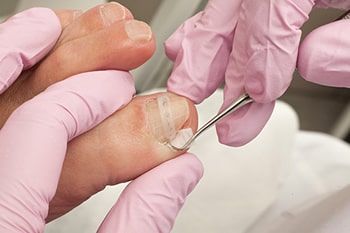Ingrown Toenails

What’s an ingrown toenail?
An ingrown toenail develops when your nail curves and grows into the flesh of your toe instead of straight out. Ingrown toenails are usually painful and can become infected without treatment. This podiatric condition is most likely to occur on your big toe but can present on any toe.
Ingrown toenails develop because of incorrectly cut toenails and excess pressure on your toes from ill-fitting shoes. To cut your toenails correctly, Dr. Mbanuzue recommends trimming them straight across-the edge of your toenail should be even with the tip of your toe.
If your shoes are too tight or you’re an athlete who spends a lot of time running, pressure from your shoes compresses your toenails and can force your nails to curve into your toes.
How are ingrown toenails treated?
If you have an ingrown toenail, your scheduled visit with Dr. Mbanuzue to address an ingrown toenail is likely to include the following steps. First, she first thoroughly numbs your toe with a local anesthetic. Then, she cuts away the part of your toe growing abnormally. Next, she applies medication and carefully bandages your toe.
You can usually return to your activities within a few days.
What causes fungal toenail infections?
Fungal toenail infections develop when a fungus enters your toenail through a microscopic injury in the nail. The fungus thrives in a warm and moist environment and slowly takes over your toenail. You’re likely to initially pick up a fungal infection at a public pool or shower, where folks are barefoot, and there’s plenty of warmth and moisture.
Signs that you have a fungal toenail infection include:
- White spots on your nail
- Yellow and thick toenails
- Brittle toenails that break easily
Fungal toenail infections aren’t usually painful, but you may experience pain from pressure on your thickened nail, and untreated infections are likely to spread to other toenails.
How are fungal toenail infections treated?
Dr. Mbanuzue offers customized treatment to clear fungal toenail infections that may feature one or more of the following:
- Topical antifungal ointments
- Oral antifungal medications
- Laser treatments
She also provides you with advice on keeping your feet clean and dry, so you reduce your risk of the infection spreading.
If you think you have a toenail infection, an ingrown toenail, or have other problems with your toenails, call or make an appointment online today at In Step Podiatry.

